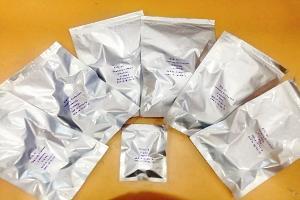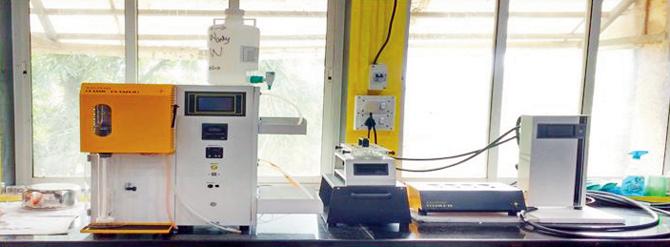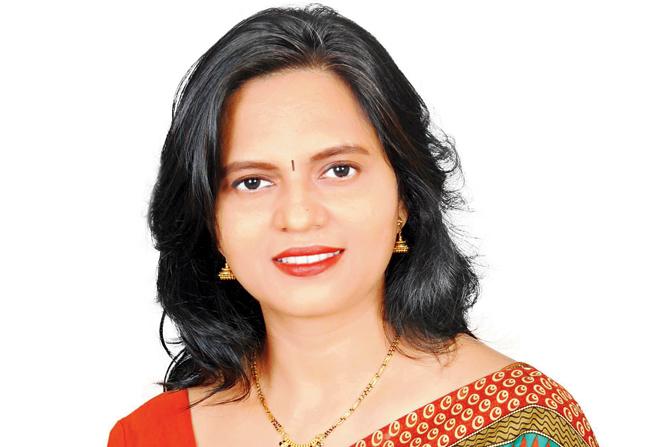Mumbai University's physics professor behind innovation wants defence forces, which now provide food with a 90-day shelf life, to benefit

Idli packaged through the team's unique technology
The Mumbai University's physics department has come up with an idea that can only be described as top shelf. Its professors and scientists have discovered a technology to preserve steamed food like idli and white dhokla for three years without adding any preservatives or impacting its softness, taste and nutritional value. The team hopes this can be used in packaging food for the armed forces, as well as for mass distribution in case of a natural calamity.
ADVERTISEMENT
The concept is the brainchild of Dr Vaishali Bambole, 48, the head of the physics department, who is now in the process of patenting the innovation. Speaking to mid-day, she said, "I have worked extensively for the last 15 years on the use of electron beam irradiation (EBI) technology, and have been using it as a catalyst for chemical polymerisation. Being a clean route, it could be used as a disinfectant for food, thereby helping increase the shelf life."
 |
|
The equipment used by the team for packaging food through the innovative EBI technology
Funding and testing
"As a scientist, I was keen on exploring this further. Therefore, sometime in 2013, I presented this idea to the Board of Radiation and Isotope Technology (BRIT), an independent unit of the department of atomic energy, who liked the new concept and agreed to provide funding of R45 lakh for research and setting up of a bio-nano lab at the department of physics in MU," she added.
After the set up, the team got down to testing. "After initial trial and error during the experiment, we found that while the technology was working well on enhancing shelf life, our concern was about the quality of packaging being used, which we had to really work on before starting the actual testing that finally began sometime in December 2015," said Dr. Bambole.

Dr Vaishali Bambole, head, MU physics department
"We had used 300 idlis, 350 white dhoklas and 5 kg of semolina [rava] upma for our testing. The batter for idli and white dhokla was prepared in the nano laboratory by using the Good Manufacturing Practice [GMP- where hands are not used for any mixing]".
EBI was then applied to freshly prepared idlis, dhokla and upma and sealed in the special packaging, which was later refrigerated. They were then periodically monitored for the sensory, microbial and chemical quality parameters of EBI-treated and non-treated food items to estimate the shelf life extension period.
Still fresh
EBI treatment can be very beneficial for eliminating microbes from food without any significant effect on sensory and biochemical parameters, according to Dr. Bambole. After packing the food, team finally opened and examined it in December 2018, and found that packets treated with EBI remained fresh, without any difference in their softness, taste, aroma and nutritional value.
She added, "Food irradiation is one of the few technologies which addresses both food quality and safety by virtue of its ability to control spoilage and food borne pathogenic microorganisms, without significantly affecting sensory or other organoleptic attributes of the food. This is particularly important for countries where the microbiological safety of many ethnically prepared meals is questionable, and their shelf life is limited due to the conditions under which they are produced, stored and distributed."
"Foods are irradiated to provide the same benefits as when they are processed by heat, refrigeration, freezing or treatment with chemicals. But, irradiation has several advantages: a) It does not significantly raise food temperature and the food does not get 'cooked' or overcooked. Unlike chemical treatments, irradiation does not leave potentially harmful residues, and b) It can be used to treat packaged food, which will remain safe and protected from microbial contamination after treatment," said Dr Bambole.
What next
Speaking about the commercial applications for EBI, Dr Bambole said, "This invention will facilitate commercial production and export of Indian cuisine and ready to eat food items through a technique which is safe, green and clean."
She is also keen on extending the use of this technology for the armed forces, and during disaster management, as the food packets being currently given out have a shelf life of only 90 days. She added, "I have spoken to soldiers at Kargil, who say they have to soften puris they can store for upto eight days with their saliva.
Also, the dry fruits they carry end up losing their crispness. We must understand that fresh, aromatic and nutritious food is a must for our soldiers who are safeguarding us. They deserve to get the best quality food, which has a long shelf life."
Dr Bambole also believes that the local administration can provide food with a better shelf life to rescue operators like the NDRF when they are helping citizens during natural calamities. With this aim in mind, Dr Bambole is keen on meeting Union defence minister Nirmala Sitharaman soon.
'Indigenous Make in India concept'
Dr P Shekar,
Ex-governing council member,MU
'This is indeed a good in-house technology. The services can be availed at a cheaper rate for bulk requirements, especially for providing quality food without any preservatives, maintaining the required nutrients and avoiding any side effects. It is truly an indigenous Make in India concept'
Krishan Kumar,
Assistant commandant, PRO, NDRF, New Delhi
'We are only the end users of products that are approved by DRDO. They are the ones who consider other parameters like technology and its commercialisation, etc.'
Catch up on all the latest Mumbai news, crime news, current affairs, and also a complete guide on Mumbai from food to things to do and events across the city here. Also download the new mid-day Android and iOS apps to get latest updates
 Subscribe today by clicking the link and stay updated with the latest news!" Click here!
Subscribe today by clicking the link and stay updated with the latest news!" Click here!






